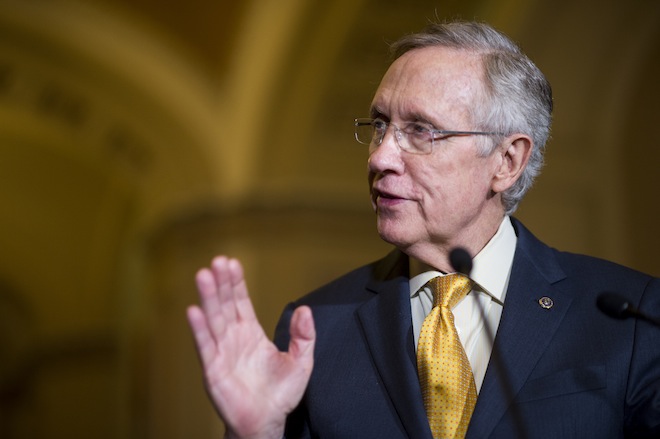Senate Majority Leader Harry Reid (D-NV) still wants filibuster reform. But he’s voicing support for a set of changes to the current filibuster rules that would fall short of the more sweeping proposal from leading reformers, and the leading Senate champion of filibuster reform believes Reid’s proposed changes are not strong enough.
In a locally aired interview over the weekend on a PBS affiliate in Las Vegas, Reid said he wants to require an obstructing minority of senators to occupy the floor and speak only after cloture has been invoked to begin debate. In other words, 41 senators could silently block debate from beginning, but once 60 senators vote to move to debate, filibustering senators must speak on the floor.
He also said he wants to reduce the current 30-hour delay between cloture and a final vote and shrink the number of votes required to go to conference with the House from a total of three down to one.
“I think what we need to do is change the filibuster. We have things that are so stupid,” Reid told Vegas PBS. “If I want to get on a bill, I have to file cloture on that. Lyndon Johnson filed cloture once in his six years; I’ve filed cloture 390-some-odd times. So we’ve got to change. If you invoke cloture on a piece of legislation, people get to 30 hours to sit around and do nothing. I want to get rid of that. I think that we should not have the 30 hours post-cloture. I think that we have to make sure that on a regular piece of legislation, if somebody wants to continue objecting to it after the cloture’s been invoked they should have to stand and talk — there should be a talking filibuster.”
He continued: “I don’t think it should take three cloture motions to get to conference. Now it takes three. I think it should only be one.”
Reid wasn’t asked specifically about the proposal spearheaded by Sens. Jeff Merkley (D-OR) and Tom Udall (D-NM), but signaled that he isn’t supporting its hard requirement that a minority seeking to stall the Senate’s business in any way occupy the floor and speak ceaselessly.
“Right now I have it set up so it’d be done post-cloture, but still, that creates a little talking on the floor that we don’t have now,” the majority leader said. “Because if you tune into CSPAN you see ‘quorum call in progress.’ Well I want to stop those quorum calls. If somebody wants to stall things let them stand and stall, not hide back in some office someplace.”
Jamal Raad, a spokesman for Merkley, told TPM that Reid’s ideas move in the right direction but aren’t enough to ease Senate paralysis. He says Merkley will keep fighting for his plan.
“[T]his approach does nothing to take on the core problem we face in the Senate: routine obstruction by the secret, silent filibuster,” Raad said in an email. “Senator Merkley will continue his discussions with Leader Reid, and continue pushing for a real talking filibuster in any final package put together.”
Changing the rules of the Senate typically requires the consent of a two-thirds majority. Reid has been negotiating with Senate Minority Leader Mitch McConnell (R-KY) on filibuster reforms that could avoid a rarely used so-called constitutional option of changing the rules with a bare majority vote. The scope of the reforms he backed in the Vegas PBS interview falls somewhere between the Merkley-Udall plan and the scaled back proposal by Sens. Carl Levin (D-MI) and John McCain (R-AZ), which would limit the minority’s ability to filibuster debate from the beginning but enhance its power to amend legislation.
Some Republicans, like Sen. Jeff Sessions (R-AL) have voiced discomfort with any change to weaken the filibuster. Other Republicans warn that changing the rules with a 51-vote majority would forever damage the Senate tradition of strong minority power. As Merkley and his allies see it, the Senate is too damaged by abuse of the filibuster.
“Fundamentally,” Raad said, “Senator Merkley believes that if 41 Senators vote for more debate, at least one should hold the floor and make his or her case in front of the American people. If obstructing Senators are not willing to do that, we should move forward with a simple majority vote.”










